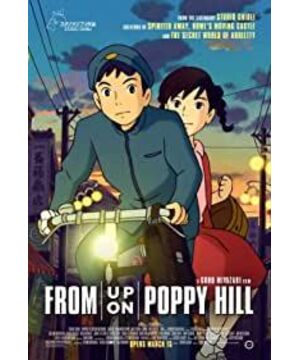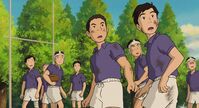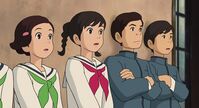If you just want to relax in the cinema, watch some comedy or VFX blockbuster, of course, most people do.
What's the point of the existence of other more serious films?
Closer to home, talk about this movie. First of all, I really wish I was the Poppy I watched before I read the review, so I could enjoy the movie more calmly and without any critical eyes.
The film is not complicated, and there are mainly two lines: the reconstruction of the Latin Quarter and the love of boys and girls.
The first clue, how to say it, is full of Japanese nostalgia, but this feeling has nothing to do with us, it is Japanese history, not ours; I will find it refreshing and interesting, but how much it touches my heart , not to mention.
But this reminds me of a small episode: when Howl's Moving Castle was about to be released, a Japanese magazine interviewed a group of well-known figures in the animation industry, and one of them (can't remember exactly who) mentioned that he guessed that the castle must be Will be destroyed, because Miyazaki's work always ends up with something huge and gorgeous to annihilate... a prophecy. Looking back at Poppy Pop now, I can't help but feel fortunate. If the old man is here, the Latin Quarter must be wiped out.
As for the second clue, it is also the story that really touched me. Indeed, in the eyes of most people, the story itself is a bit bloody. But in fact, what I want to say is that all love stories are bloody, and there is no plot that is not bloody, whether it is in movies, TV, animation or even in reality. Loving someone is a thousand turns, mixed feelings, and confusion, but this is also the most beautiful aspect of love. Seeing that Mei Lu was angry for ignoring her in the wind, I couldn't help but want to say, it's cute.
Mei Lu was waiting on the window sill for the signal flag on Kazama's boat, Mei Lu helped Kazama carve wax paper, Mei Lu gave Kazami's idea to save the Latin Quarter, Mei Lu couldn't help but ran to the auditorium to watch Kazama's debate... In fact, because it was Fengjian, so as long as he can do it, he will do it for him, and this is also a form of love. (Wu Lang still inherited the characteristics of the old man who likes to portray tough women)
Going back to the beginning of the question, what do we really see in the more serious movies? I think watching a movie shows us the really beautiful things, just like in Poppy, if there is no heavy foreshadowing in front, when the tram bids farewell to the scene, we will not feel the beauty of each other's heartfelt, and we will not see the simple Girlish feelings... and these are things that can touch the hearts of people. (The farewell confession of the tram is quite photogenic in Japanese dramas.)
All the touching plots in Poppy are so ordinary, so accessible, but so fragile, as if just missing that moment, can no longer be touched.
Happiness is like this, fleeting, but it really existed: when the Latin Quarter was reserved, the students of various interest departments, Meru and the wind standing on the bow of the boat after knowing the truth, it must be true at that moment. I really felt happiness, and this, I think, is exactly what the director wanted to convey to us.
View more about From Up on Poppy Hill reviews











